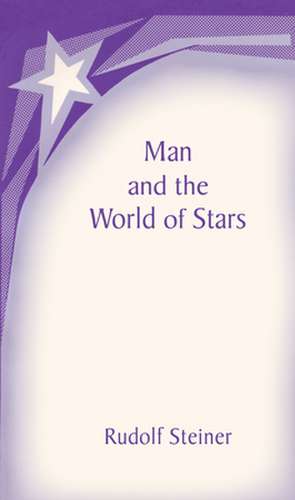Man and the World of the Stars
Autor Rudolf Steiner Traducere de D. S. Osmonden Limba Engleză Paperback
Preț: 107.85 lei
Nou
Puncte Express: 162
Preț estimativ în valută:
20.64€ • 21.43$ • 17.21£
20.64€ • 21.43$ • 17.21£
Carte indisponibilă temporar
Doresc să fiu notificat când acest titlu va fi disponibil:
Se trimite...
Preluare comenzi: 021 569.72.76
Specificații
ISBN-13: 9780880100083
ISBN-10: 0880100087
Pagini: 208
Dimensiuni: 134 x 207 x 12 mm
Greutate: 0.26 kg
Ediția:2
Editura: Steiner Books
ISBN-10: 0880100087
Pagini: 208
Dimensiuni: 134 x 207 x 12 mm
Greutate: 0.26 kg
Ediția:2
Editura: Steiner Books
Notă biografică
Rudolf Steiner (1861-1925) was born in the small village of Kraljevec, Austro-Hungarian Empire (now in Croatia), where he grew up. As a young man, he lived in Weimar and Berlin, where he became a well-published scientific, literary, and philosophical scholar, known especially for his work with Goethe's scientific writings. At the beginning of the twentieth century, he began to develop his early philosophical principles into an approach to systematic research into psychological and spiritual phenomena. Formally beginning his spiritual teaching career under the auspices of the Theosophical Society, Steiner came to use the term Anthroposophy (and spiritual science) for his philosophy, spiritual research, and findings. The influence of Steiner's multifaceted genius has led to innovative and holistic approaches in medicine, various therapies, philosophy, religious renewal, Waldorf education, education for special needs, threefold economics, biodynamic agriculture, Goethean science, architecture, and the arts of drama, speech, and eurythmy. In 1924, Rudolf Steiner founded the General Anthroposophical Society, which today has branches throughout the world. He died in Dornach, Switzerland.
